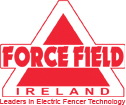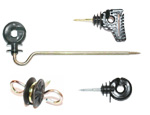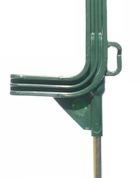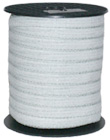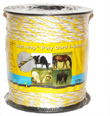Electric Fencing Help
It can be daunting knowing where to start when looking into what sort of electric fencing you require. In this section we aim to explain some of your questions about an electric fence, it's applications, materials, installation, etc.
Please Note - Feel free to contact us on the numbers above for no obligation help
Insulators
Good quality and correct selection is essential to ensure the efficiency of the fence. The choice depends on the type of posts & conductor being used. Because of the different make up of polyrope, polytape, steel wire and twine most will have insulators which are made solely for them and some fence insulators can be used for several types of conductor.
Careful attention must be paid to which insulators are chosen for your electric fence and how they might affect it's performance. Obviously you'll look to get the right ones to go with the conductor you want but it's advisable to take into consideration whether they are to be used permanently or temporarily and the speed and hassle of installation and removal. For instance putting up an electric fence with ring instulators for 20mm tape is quick and painless when using a drill chuck but if it were done using clamping fence insulators then it would take considerably longer.
For a temporary electric fence, the ring insulators would be fine but for a permanent barrier, the rubber cushioned or clamping insulators would hold the tape more securely. Using these would eliminate any 'wind-rub' and should there be a break on the line at any time, the tape would be held in position and not run through the insulators and flap in the wind.
If you are in any way confused about which insulators would be suitable for your short or long term requirements please don't hesitate to get in touch.
Plastic Posts / Polyposts
If a permanent fence is planned, chemically treated softwood posts with insulators, or non-conductive hardwood posts are ideal. Steel, fibreglass or plastic posts (polyposts) can be a viable alternative.
If it is a temporary fence for strip grazing, plastic posts offer portability and ease of construction. These come in two specifications. The economy post is an excellent temporary polypost but the superior electric fencing posts come with a 3 year manufacturers warranty and have a nigh unbreakable footplate.
When choosing your posts the first thing to consider is the animal you are fencing in (or out) and what height will you be needing to string lines over. If you are using the posts to strip graze cows or sheep in a field then the regular 105cm posts are fine but for horse paddocks it is different.
For ponies and smaller more placid horses the visual effect of a 3' post with a couple of lines of tape on it is enough to keep them at bay. If the field is ever to have larger horses then that will call for our tall plastic posts. We have 2 varieties of these - our standard posts are in fact a very good quality fencepost and we also have a superior quality, heavyweight plastic post. For very large horses we have our extra tall posts which will keep the top line of the fence about 4'6" high.
Conductors
Twine
Electric fencing twine or poly-wire is a good choice for temporary electric fences for most animals as it's more visible than steel wire. It is lightweight and easy to handle, install and rewind when used as a portable fence. It is less durable than steel but well suited to strip grazing and is easily tensioned.
Twine is ideal for temporary grazing, strip or rotational grazing, pet control, garden and pond protection.
Electric fence twine or poly-wire should only be used to fence slow moving animals such as dairy cows and is not advised for horses as they need either tape or rope as it's more visible.
Tape
Electric fence tape provides greater visibility than wire or twine and is therefore more suitable for fast moving animals like horses. While the reinforced edges help protect the poly-tape from wear and tear it is subject to increased wear in windy conditions. Becasuse of this, it's best to select the narrowest tape appropriate to your fence. 20mm electric tape is suitable for most situations but 40mm wide tape is not recommended if your field or paddock is in a windy area unless it's well secured using tape insulators that clamp the tape tightly. When connecting two lines of fencing tape together it is imperative to have a good electrical connection between the conductors so it's best to use proper joiners / tape connectors.
Rope
Electric fencing rope, or poly-rope as it's often called, is the perfect electric fencing conductor for horses. It's visible, it's very strong and it won't catch the wind as fence tape is prone to do. The fencing rope comes in a variety of specifications and strengths. The polyropes with stainless steel conductors are ideal for short to medium length fence lines and the high-spec ropes containing the superior tinned copper conducting lines are for longer distance fencing and higher powered energisers. Rope is generally used with wooden posts and held by ring insulators screwed into the fence posts or distance insulators which can be used to keep the fencing polyrope about 10" out from the fence. Rope can also be used with plastic posts for temporary and mobile horse paddocks.
Electric Netting
Electric netting can be the ideal way to keep foxes out and your animals in. It is used extensively for poultry, sheep and rabbits and occasionally goats. All but the bottom horizontal polywires are electrifiable and both the poultry and rabbit electric nets start off with small spacings at the bottom and increase as the net height increases. The sheep electric net has a larger bottom spacing to make allowances for the grass height in the field. Both the poultry electric nets and the rabbit electric netting come in an olive green which blends well into the surroundings and is more pleasing on the eye and the sheep netting comes in orange for easy visibility in the field.
While the netting is an excellent way of keeping your animals in and foxes & rabbits out, it does tend to be more prone to earth leakages than other methods of electric fencing so please consider this when making your choice of energiser.
All the electric nets for sheep, chickens and rabbits have clips at the top where the horizontal polywires converge and can be easily joined to other nets.

